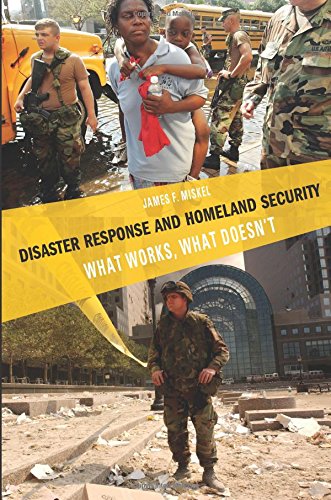PDF⋙ Disaster Response and Homeland Security: What Works, What Doesn't (Stanford Security Studies) by James Miskel
Disaster Response and Homeland Security: What Works, What Doesn't (Stanford Security Studies) by James Miskel


Disaster Response and Homeland Security: What Works, What Doesn't (Stanford Security Studies) by James Miskel PDF, ePub eBook D0wnl0ad
From reader reviews:
Edris Sibert:
Reading a book being new life style in this season; every people loves to read a book. When you go through a book you can get a large amount of benefit. When you read guides, you can improve your knowledge, since book has a lot of information onto it. The information that you will get depend on what forms of book that you have read. If you wish to get information about your analysis, you can read education books, but if you want to entertain yourself you can read a fiction books, these us novel, comics, and also soon. The Disaster Response and Homeland Security: What Works, What Doesn't (Stanford Security Studies) provide you with a new experience in looking at a book.
Jessica Ball:
Don't be worry when you are afraid that this book will filled the space in your house, you could have it in e-book technique, more simple and reachable. This kind of Disaster Response and Homeland Security: What Works, What Doesn't (Stanford Security Studies) can give you a lot of pals because by you investigating this one book you have matter that they don't and make you actually more like an interesting person. This particular book can be one of a step for you to get success. This publication offer you information that might be your friend doesn't know, by knowing more than some other make you to be great persons. So , why hesitate? We need to have Disaster Response and Homeland Security: What Works, What Doesn't (Stanford Security Studies).
Joyce Cannon:
E-book is one of source of know-how. We can add our information from it. Not only for students but also native or citizen require book to know the upgrade information of year to help year. As we know those publications have many advantages. Beside most of us add our knowledge, could also bring us to around the world. With the book Disaster Response and Homeland Security: What Works, What Doesn't (Stanford Security Studies) we can take more advantage. Don't someone to be creative people? For being creative person must choose to read a book. Simply choose the best book that appropriate with your aim. Don't always be doubt to change your life with this book Disaster Response and Homeland Security: What Works, What Doesn't (Stanford Security Studies). You can more appealing than now.

Read Disaster Response and Homeland Security: What Works, What Doesn't (Stanford Security Studies) by James Miskel for online ebook
Disaster Response and Homeland Security: What Works, What Doesn't (Stanford Security Studies) by James Miskel Free PDF d0wnl0ad, audio books, books to read, good books to read, cheap books, good books, online books, books online, book reviews epub, read books online, books to read online, online library, greatbooks to read, PDF best books to read, top books to read Disaster Response and Homeland Security: What Works, What Doesn't (Stanford Security Studies) by James Miskel books to read online.
Komentar
Posting Komentar